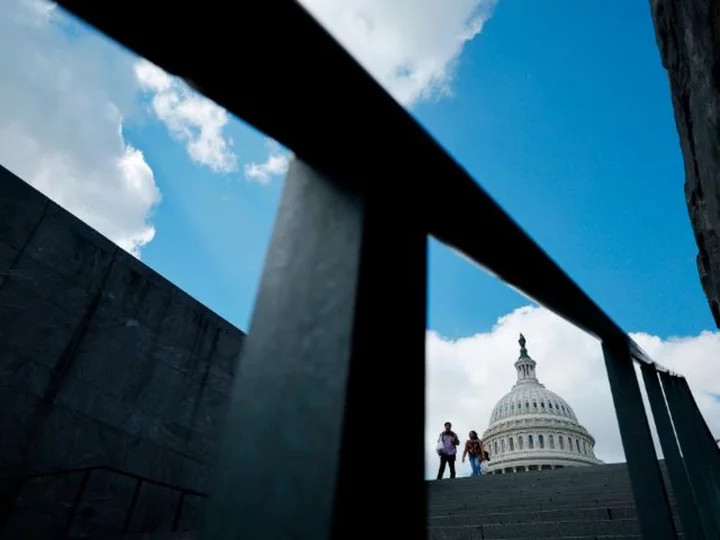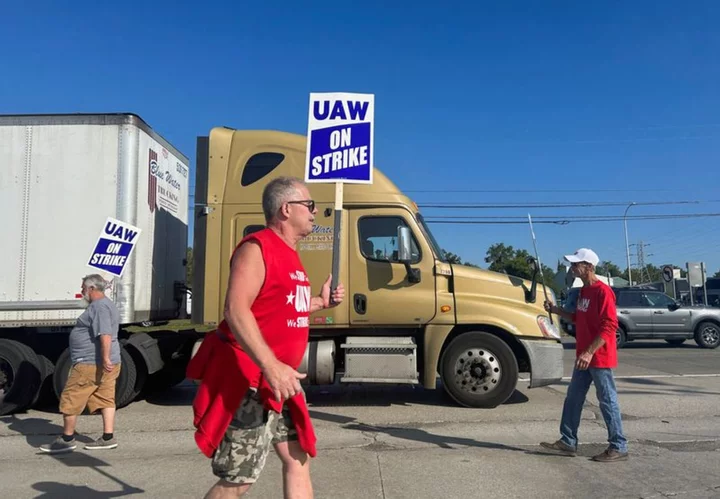It's a delicate time for the American economy.
The long-rumored recession has not arrived, and yet economic threats are everywhere.
Oil prices are racing towards $100 a barrel, threatening to lift already-high gas prices and overall inflation. The UAW has launched an unprecedented strike against the Big Three automakers. Federal student loan payments are making their dreaded return in October. And fear has returned to Wall Street as the Federal Reserve digs in for a longer fight against inflation.
Against this precarious backdrop, Washington is on the verge of a messy shutdown of the federal government.
A shutdown probably won't wreck the economy, especially if it's short. But this kind of political chaos definitely won't help matters.
And if it a shutdown lasts long enough, it could, along with these other headwinds, do some real damage.
"It was already a perfect storm. And now there's a potential government shutdown," said Greg Valliere, chief US policy strategist at AGF Investments.
Confidence is always a fragile thing. It's hard to see how Washington would help instill confidence among inflation-weary Americans, not to mention business leaders and investors. CEOs are already sounding the alarm.
"It will further dent business and consumer confidence at a time when a confluence of risks threatens to drive growth in the final quarter of the year well below 1% and conceivably result in a net decline in growth," said Joe Brusuelas, chief US economist at RSM.
To be sure, the actual impact to US economic growth may not be large.
Goldman Sachs estimates that a shutdown would dent GDP by 0.2 percentage points for each week it lasts.
Yet that hit to GDP could add up in a lengthy shutdown. And it comes at a time when all of these other wild cards, from the UAW strike, high gas prices and the return of student loan payments, are already weighing on growth.
Air travel, government paychecks at stake
A government shutdown would likely disrupt the lives of millions of Americans — and not just those who work for Uncle Sam.
Nearly four million federal employees would not get paid until the government reopens. That's a huge problem for the many workers who live paycheck to paycheck. Consider that the members of the American Federation of Government Employees earn, on average, between $55,000 and $65,000 a year.
A shutdown, if it lasts long enough, could even halt paychecks to the troops.
Even though active-duty military would be required to work, they would not get paid until the government reopens. Some $4 billion in paychecks due to be sent out on October 13 to 1.3 million active-duty service members is at stake, according to Goldman Sachs.
Everyday Americans would feel the impact of a shutdown through the interruption of services.
For instance, there is a risk of airport delays if air traffic controllers and TSA workers call out sick as they wait to get paid. That's what happened during the last shutdown, the one that began in late 2018 and was the longest in US history.
The US Travel Association estimates the domestic travel economy would lose as much as $140 million a day from a government shutdown.
The Fed could be flying blind
Although national parks stayed open during the last shutdown, they were not fully staffed.
Likewise, food and hazardous waste inspections would be halted during a shutdown.
Companies that rely on the federal government as a major customer would also be hurt.
Private contractors, including those that supply office furniture, military equipment, janitorial services and even cloud computing, would "take it on the financial chin," according to Mark Zandi, chief economist at Moody's Analytics.
"When the government is shut down, these companies don't get paid, and their employees aren't able to work. This eventually could hurt millions of workers," Zandi said.
And here's another problem, especially given the suddenly dark mood on Wall Street: Economic statistics on unemployment and inflation won't be released during a shutdown. That means Fed officials and investors will need to make key decisions without full visibility into what's actually happening in the economy.
"That really confuses things for both the markets and the Fed," said AGF's Valliere.
'Intensifying political polarization'
Moody's Investors Service even raised the specter of a shutdown hurting America's credit rating.
Moody's, the only major ratings firm to keep a perfect credit rating on the United States, said a shutdown would "underscore the weakness of US institutional and governance relative to other AAA-rated sovereigns that we have highlighted in recent years."
In other words, countries with perfect credit ratings don't regularly experience political chaos.
"In particular, (a shutdown) would demonstrate the significant constraints that intensifying political polarization put on fiscal policymakers at a time of declining fiscal strength," Moody's said.
As to what would Moody's say if the government shuts more than once — we might find out.
"Multiple shutdowns are a distinct possibility," economists at Goldman Sachs warned clients earlier this week. "Uncertainty regarding federal operations will likely persist for the next few months."
Given all the other obstacles facing the economy, chaos in Washington is the last thing the economy needs.









